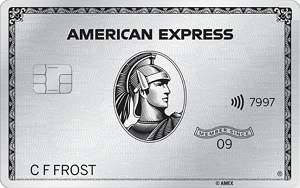American Express Platinum Charge Card Review
We review New Zealand's most premium card, which promises a lot of perks to anyone who stays in a lot of hotels and travels extensively.
Updated 18 July 2024
Important: Please note that applications for the AMEX Platinum Charge Card are currently paused. We are keeping this review live as we expect the card to return to the market soon. In the meantime, we suggest considering the AMEX Gold Rewards Card as an alternative - can can read the review here.
Important: Please note that applications for the AMEX Platinum Charge Card are currently paused. We are keeping this review live as we expect the card to return to the market soon. In the meantime, we suggest considering the AMEX Gold Rewards Card as an alternative - can can read the review here.
Who Is The American Express Platinum Card for?
Our View: We believe the card won’t suit the following people:
Our guide outlines the benefits, pros and cons and concludes on the card and suggests typical cardholders. We cover:
To apply for an American Express Platinum Card, you’ll need to be able to meet the following criteria:
Advertising Disclaimer: MoneyHub may earn a referral bonus for anyone that’s approved through some of the below links. Our research and findings are independent of any bank, credit card issuer, or product manufacturer/service provider, and have not been endorsed by any of these entities. Please see our Advertising Policy for more details about how we make money.
Know This: Are you a business owner? You can now use your AMEX to pay IRD and ACC bills using RewardPay. Our review explains how it works, what it costs and what benefits you will earn. As the Platinum Card earns Membership Rewards Points, it's one of two American Express credit cards popular with business owners or directors who can use their card to pay business costs and earn points for personal use.
Reminder: Please note that applications for the AMEX Platinum Charge Card are currently paused. We are keeping this review live as we expect the card to return to the market soon. In the meantime, we suggest considering the AMEX Gold Rewards Card as an alternative - can can read the review here.
- Ultimately, this is a big-spend card. The $1,250 annual fee defines its market, and cardholders need to have the funds available to clear the balance after every month to avoid charge card penalties (up to 3.25% or $20 of the closing balance, whichever is greater).
- While the card may be found in the wallet of high-earning business people, company owners and privately wealthy individuals, there are, arguably, many high-earning/high net-worth New Zealanders may find a use for the card if they're actively travelling and spending.
- The exclusive lounge access perks are, in a nutshell, unlimited American Express Centurion Lounge access, alongside American Express International lounge access. We regard the American Express Centurion Lounge as First Class lounge-level, with dining rooms, cocktail bars and fine wine selections. Centurion Lounges are open in Sydney and Melbourne, with other locations including London, Hong Kong and the USA.
- Other benefits include Priority Plus lounge membership for the cardholder and one guest, insurance benefits, access to the American Express Fine Hotels program, premium hotel chain loyalty memberships, a travel credit and dining credits for selected restaurant spends.
- Our view is simple - if you need to evaluate in detail whether you can justify the annual fee and/or whether you'll use the perks, the card is probably not for you. While the card offers hundreds of dollars in restaurant and travel rewards, you'll most likely need to spend $100,000+ a year on your card to earn enough loyalty points to pay for the card. If you're a high spender, this card delivers benefits and perks that well exceed the annual membership fee.
Our View: We believe the card won’t suit the following people:
- Anyone spending less than $50,000 a year on a credit card
- Those who don’t travel internationally at least twice a year. If that’s you, there is little opportunity to utilise the full range of benefits outside of hotels in New Zealand.
- Those who have existing elite membership with an airline (i.e. Air New Zealand Airpoints) and one or two hotel chains (i.e. Hilton Honors and/or Accor Plus). In such cases, you’re covered for lounge and hotel perks; the Priority Pass network is extensive, but Star Alliance Gold or oneworld Sapphire/Emerald will cover you and, arguably, provide a superior airport (and lounge) experience (with the exception of the high-end Centurion Lounges, available predominantly across America and London).
Our guide outlines the benefits, pros and cons and concludes on the card and suggests typical cardholders. We cover:
- Annual Fee and Membership Rewards
- The Platinum Card - Benefits in Detail
- Pros and Cons
- Summary and Conclusion
- Must-Know Platinum Card Facts
To apply for an American Express Platinum Card, you’ll need to be able to meet the following criteria:
- Be aged 18 or over
- Have no history of bad debt or payment default
- Have the right to work in New Zealand, and
- If self-employed, have been trading for at least 18 months (or 12 months if you hold an existing American Express issued Card)
Advertising Disclaimer: MoneyHub may earn a referral bonus for anyone that’s approved through some of the below links. Our research and findings are independent of any bank, credit card issuer, or product manufacturer/service provider, and have not been endorsed by any of these entities. Please see our Advertising Policy for more details about how we make money.
Know This: Are you a business owner? You can now use your AMEX to pay IRD and ACC bills using RewardPay. Our review explains how it works, what it costs and what benefits you will earn. As the Platinum Card earns Membership Rewards Points, it's one of two American Express credit cards popular with business owners or directors who can use their card to pay business costs and earn points for personal use.
Reminder: Please note that applications for the AMEX Platinum Charge Card are currently paused. We are keeping this review live as we expect the card to return to the market soon. In the meantime, we suggest considering the AMEX Gold Rewards Card as an alternative - can can read the review here.
MoneyHub Founder Christopher Walsh shares his views about the American Express Platinum Card:
|
"New Zealanders are familiar with credit cards with $50 or even $150 annual fees - The Platinum Card is not a standard card and offers a unique level of benefits.
I believe that anyone who would spend $50,000+ a year on a credit card and has a lifestyle that regularly uses hotels, restaurants, rental cars and flights will see value in the card. The insurance benefits are excellent, and while it's unlikely the lounge access perks are that useful (especially if you have an Air New Zealand Gold/Elite or Qantas Gold/Platinum card), the hotel benefits are unrivalled. In a nutshell, this is a "the more you spend, the more benefits you can draw down on" type of card. You'll need a $60,000+ per year salary and you must make payments on time to avoid penalties. If you don't, the card becomes expensive. If you're hesitating on the $1,250 fee, the card is probably not for you - there are plenty of other travel and rewards credit cards. Ultimately, if you're a high earner (I would suggest over $100,000 p.a), fly business or first class when you travel overseas, travel frequently and enjoy entertaining and hotels, the Platinum Card is likely to be an attractive proposition. Finally, the 100,000 bonus Membership Rewards points fast-tracks free business class reward flights with top-rated airlines like Qatar Airways and Singapore Airlines, which is a significant perk. We explain this in the Pros and Cons section below)". |
MoneyHub Founder Christopher Walsh explains the AMEX Platinum Card in detail in the video below:
Know This First - Annual Fee and Membership Rewards
1. The Platinum Card's Welcome Bonus and Annual Fee
- Annual fee: $1,250 (incomparable to any other credit offered in New Zealand)
- Bonus offer: 100,000 Memership Reward points when you apply online for the Platinum Card, are approved and spend $1,500 on your new Card within the first 3 months. New Card Members only.
- Earn Membership Rewards: The Platinum Card earns at a rate of 2 points for every $1 spent. You can use Membership Reward points to pay for travel with American Express directly, or you can convert them to other airline and hotel programs. As a background, 150 Membership Rewards points = 1 Air New Zealand Airpoints Dollar while 2 Membership Rewards points = 1 Qantas Frequent Flyer Point.
2. Redeeming Membership Points
What point value will I earn? This is best explained with an example:
- If you spend $100,000 on the card in one year, you will earn 200,000 Membership Reward points.
- 200,000 points translate to around 100,000 Qantas Frequent Flyer points (enough for a one-way Business Class Auckland to Hong Kong flight operated by Cathay Pacific), or just shy of 70,000 Qatar Airways Avios, which is enough for a one-way Auckland to Doha Business Class flight in their Qsuite. Our guide to the best use of AMEX points has more details.
- If you use the points with American Express, you'll earn around $1,500 of travel credit.
- Otherwise, a $1,000 credit on your card costs 192,000 Membership Rewards points.
- The benefits you receive will depend on your travel preferences - Qatar Airways, Qantas Frequent Flyer redemptions and Cathay Pacific arguable offer the best value if you select business or first class, whereas earning Membership Reward Points to generate a credit on your card is the most cost-effective.
The Platinum Card - Benefits in Detail
1. Welcome Bonus – 100,000 Membership Rewards Bonus Points
New cardholders receive 100,000 Membership Rewards Bonus Points when spending $1,500 on the card in the first 3 months. The 100,000 points are worth around $665 Air New Zealand Airpoints (converted at a ratio of 150 = A$1). If you want credit on your card, you can use points – 104,000 buys a $500 credit. However, the welcome bonus is a one-off benefit, and it won’t be offered if you renew your card the following year.
Our view: The signup bonus when you apply online is generous and helps absorb some of the annual fee while you get used to the benefits of the card. Importantly, the bonus points are a one-off benefit and won't be offered on your card renewal.
Our view: The signup bonus when you apply online is generous and helps absorb some of the annual fee while you get used to the benefits of the card. Importantly, the bonus points are a one-off benefit and won't be offered on your card renewal.
2. Hotel benefits
Platinum Card members are entitled to two core hotel benefits - access to the Fine Hotels + Resorts programme and hotel status memberships.
What does Fine Hotels + Resorts offer?
What hotel status memberships are available, and what are the benefits?
Benefits: Gold-level hotel memberships offer discounts, freebies, higher point earning rates and lifestyle perks that are usually reserved for a hotel chain's most loyal customers.
Know This: Hotel Status levels renew even if you don't use the benefits. American Express makes it clear that you will maintain the hotel gold status levels without meeting otherwise required criteria while you're an American Express Platinum Cardholder. Your Accor Plus membership will also be renewed.
Our view: The Fine Hotels + Resorts programme makes good hotels even more attractive (and better value) with a number of exclusive perks. The hotel status benefits give you gold-level membership with four major hotel chains that would otherwise require 20-30+ nights of stays per year each. If you stay in a lot of hotels every year, both the Fine Hotels + Resorts and the gold status benefits will most likely be very useful.
What does Fine Hotels + Resorts offer?
- Cardholders can book hotels around the world using Fine Hotels + Resorts, an American Express-powered booking system (like Expedia, Hotels.com or Booking.com).
- The difference is that the rates offered by Fine Hotels + Resorts are exclusive to Platinum Cardholders and they are heavy with benefits.
- For example, where a Booking.com rate may be "room only", Fine Hotels + Resorts will offer a US$100 food and beverage credit to be used during your stay, room upgrade upon arrival and noon check-in (when available), daily breakfast for two, free WiFi and guaranteed 4pm late check-out.
- Research suggests Fine Hotels + Resorts' hotel rates are similar to those offered by Expedia, Hotels.com or Booking.com etc., with the add-on benefits making a reservation using Fine Hotels + Resorts more cost-effective.
What hotel status memberships are available, and what are the benefits?
- Hilton Honors - Gold status (Gold is usually earned when you stay 20+ nights per year)
- Marriott Bonvoy - Gold status (Gold is usually earned when you stay 25+ nights per year)
- Accor - Complimentary membership in Accor Plus (usually NZ$299/year) and includes one complimentary night stay. This translates to Accor Silver.
Benefits: Gold-level hotel memberships offer discounts, freebies, higher point earning rates and lifestyle perks that are usually reserved for a hotel chain's most loyal customers.
Know This: Hotel Status levels renew even if you don't use the benefits. American Express makes it clear that you will maintain the hotel gold status levels without meeting otherwise required criteria while you're an American Express Platinum Cardholder. Your Accor Plus membership will also be renewed.
Our view: The Fine Hotels + Resorts programme makes good hotels even more attractive (and better value) with a number of exclusive perks. The hotel status benefits give you gold-level membership with four major hotel chains that would otherwise require 20-30+ nights of stays per year each. If you stay in a lot of hotels every year, both the Fine Hotels + Resorts and the gold status benefits will most likely be very useful.
3. Airport Lounge benefits
Per our discussions with American Express during our research, we can confirm the following:
Our view: If you travel in first or business, or have a frequent flyer card (or Qantas/Koru membership etc.) that grants airline-operated lounge access, the American Express International Lounge Collection won't provide much benefit unless you like "lounge hopping". However, access to the Centurion Lounge network, arguably regarded as First Class-level lounges, is a significant benefit. However, these lounges are mostly located in the USA, London Heathrow (Terminal 3) and Hong Kong. However, Sydney and Melbourne airports will open Centurion Lounges in 2022.
- Lounge access is unlimited for Centurion and unlimited for American Express international. Further lounge access is provided by Priority Pass, Plaza Premium, and Delta Sky Club, which are 'third party' lounges. Some restrictions may apply (i.e. capacity or closures), but given the extensive network we see the risk of being 'loungeless' at an airport as minimal.
- Please note, within New Zealand, the options are limited; Qantas and Air New Zealand lounges are all excluded.
Our view: If you travel in first or business, or have a frequent flyer card (or Qantas/Koru membership etc.) that grants airline-operated lounge access, the American Express International Lounge Collection won't provide much benefit unless you like "lounge hopping". However, access to the Centurion Lounge network, arguably regarded as First Class-level lounges, is a significant benefit. However, these lounges are mostly located in the USA, London Heathrow (Terminal 3) and Hong Kong. However, Sydney and Melbourne airports will open Centurion Lounges in 2022.
4. $200 per year to spend on travel
A cardholder is entitled to a $200, which can be redeemed for pre-paid airfares, car hire or hotel bookings through American Express Travel.
Our view: We take the view that this is ‘valued’ at $200, and is a useful discount against any larger booking.
Our view: We take the view that this is ‘valued’ at $200, and is a useful discount against any larger booking.
5. 2 X $150 dining credits
American Express has a number of dining partners throughout New Zealand. If you visit them, spend over $150 on one bill, you’ll get $150 credited to your statement. The dining credit resets every six months. The participating restaurants include Jervois Steakhouse, Craggy Range Restaurant, Sidart, Euro, Ebisu and Botswana Butchery, among others.
Our view: The offer is simple - spend $150+ at a qualifying restaurant and get $150 back on your credit card statement, up to twice a year. We like this add-on benefit and interpret it as two free dinners.
Our view: The offer is simple - spend $150+ at a qualifying restaurant and get $150 back on your credit card statement, up to twice a year. We like this add-on benefit and interpret it as two free dinners.
6. Complimentary Travel Insurance
American Express' strong travel insurance is a significant benefit. While specialist travel insurance companies offer a range of policy options, American Express arguably offers an all-in-one policy. To be covered, you'll need to pay for your travel with your Platinum Card (or use Membership Rewards points). Best of all, your family is covered (if they travel with you), and an extensive number of benefits apply:
Our view: American Express delivers round-the-clock insurance and assistance, which should match the benefits of any other policy on the market (excluding pre-existing conditions). With no additional cost, it's a strong offering.
- Loss Damage Waiver Cover - the policy will cover up to $125,000 if you have an incident with a rental car. You'll also save money by avoiding the need to buy add-on rental car excess insurance.
- Transport Accident Cover and Medical Expenses - the policy covers $1,000,000 (accident) and $20,000,000 (medical expenses).
- Domestic and International Travel Insurance - whether you travel in New Zealand or overseas, you're covered.
- Personal Liability Cover - up to $3,000,000.
- Baggage, Money, Documents and Cancellation Protection - your bags, money and documents will also be covered up to $60,000, and if you need to cancel your travel due to medical reasons etc., you'll be covered up to $30,000.
- Global Assist Service - Cardholders can access American Express' English-speaking medical and legal services.
Our view: American Express delivers round-the-clock insurance and assistance, which should match the benefits of any other policy on the market (excluding pre-existing conditions). With no additional cost, it's a strong offering.
7. Complimentary Smartphone Screen Insurance
Unique to American Express, if you buy your phone with the card, or pay for the plan or SIM-only deal using your card, you are protected for damage to your screen. This is a helpful perk of the credit card.
How does this work?
Our view: This is a useful benefit and you can access it by paying for your phone plan or SIM-only deal with your Platinum Card.
How does this work?
- You can make a maximum of two claims per 12-month period, with a maximum cover of $500 per claim.
- You’ll need to pay an excess of 10% of the claimed amount. As an example, if your repair bill was $300, you would be reimbursed $270 and pay $30 yourself.
- Be aware: The policy is not phone insurance, which is far more comprehensive, so you won’t be covered if you lose or damage your phone.
Our view: This is a useful benefit and you can access it by paying for your phone plan or SIM-only deal with your Platinum Card.
8. Complimentary Purchase Protection Cover
The American Express Platinum card provides excellent purchase protection. If you purchase an eligible item on the card and it’s accidentally damaged or stolen within 90 days, American Express will reimburse you for the amount you paid for the item. The limit is up to $3,500 per item and $30,000 per year. There is a $50 excess per claim, with specific exclusions including:
Claiming
Our view: It's an outstanding offering, and cardholders also benefit from Buyer's Advantage Cover, which extends the manufacturer's original warranty by up to 12 months on eligible products.
- Any items left unattended in a public place or
- Theft of or damage to items in a vehicle or
- Theft of or damage to jewellery or watches in baggage unless carried by hand by you (or someone known to you) or
- Theft of or damage to cash, tickets, animals, living plants, perishable goods or
- Theft of or damage to electronic items and equipment, i.e. phones and computers/laptops from your place of work
Claiming
- You must provide American Express with copies of invoices and/or receipts relating to the item to prove the item was charged to your card and
- For all claims, you’ll need to have reported the lost or stolen to the police within 48 hours (if you don’t have a police report)
Our view: It's an outstanding offering, and cardholders also benefit from Buyer's Advantage Cover, which extends the manufacturer's original warranty by up to 12 months on eligible products.
9. Chargebacks from fraudulent transactions
You’ll also be protected against fraudulent transactions made using your Card details with the American Express Fraud Protection Guarantee. In our chargeback research, we found that American Express offered the best consumer protection. The benefits include having a helpline, a provider that has a transparent process for its customers and a track record of approving chargebacks.
Our view: We have observed difficulties with securing chargebacks using Mastercard and Visa-issued cards as issuing banks are involved and complicate the process. American Express is much easier to deal with in this regard as they are an all-in-one card issuer and the card provider.
Our view: We have observed difficulties with securing chargebacks using Mastercard and Visa-issued cards as issuing banks are involved and complicate the process. American Express is much easier to deal with in this regard as they are an all-in-one card issuer and the card provider.
Pros and Cons
Pros:
Cons:
- If you spend big, you'll earn big with travel-related perks – 2 Membership Reward points per $1 spent generates a lot of Airpoints, Qantas Frequent Flyer points, Singapore Airlines Krisflyer points, Qatar Airways Avios or travel credit.
- The 100,000 bonus Membership Rewards points at sign-up is significantly valuable - our guide to the best way to use AMEX points has more details. You will need to spend $1,500 in the first three months to receive the 100,000 point bonus.
- Unrivalled perks and benefits – no other card offers what the Platinum Card does, with hotel and insurance benefits being key to the offering. Additional freebies such as dining, lounge access and extended warranties compliment the package.
- Unlimited Centurion Lounge access - The network is extensive across the US, with Sydney and Melbourne Centurion Lounges now open too, and more opening in 2024 and beyond.
- Customer Service – With American Express, you have a direct line, but if you use Visa and Mastercard, you’ll have to deal with your bank. Most New Zealand banks use a multi-option call centre for credit card help with standard office hours. Any troublesome issues may be ‘referred’ to Visa or Mastercard for ‘review’ and 'decision'. American Express operates specific 0800 hotlines which are open 24/7 and makes decisions directly.
- Favourable Customer Dispute Terms – if you experience fraud or wish to question a transaction, American Express will actively fight in your corner. Our guide to chargebacks has more details.
- Cards are increasingly accepted at major New Zealand retailers – You can use your card at Countdown, New World, PAK'nSAVE and other supermarkets. Other retailers include most petrol stations, rental car, hotel and airline websites.
Cons:
- The $1,250 annual fee is prohibitive to many New Zealanders, but this is a card that appeals to a certain type of market, as a late model European car, a five-night stay at Blanket Bay or first class ticket from Auckland to Europe would.
- A number of non-chain retailers don’t accept American Express as a payment method so you may need a backup credit card.
- The card is a charge card; if you don't pay the balance due, you'll be liable for a $20.00 fee or 3.25% of the closing balance, whichever is greater, of the overdue amount. For example, if you have a $10,000 balance due and don't make the repayment, you'll be charged $325.
Summary and Conclusion
- There’s a lot to like about the Platinum Card. If you ignore the lounge access perks, which may be surplus to requirements, the rewards/benefit rate is around 1% to 1.50%. If you spend over $100,000 a year on the card, the rewards will pay for the card's annual fee.
- Add in $300 of dining credits, $200 of travel credit, free hotel perks, comprehensive insurance at home and overseas, and you can easily generate $1,000+ of related benefits. We believe that a cardholder spending $100,000 a year will earn about $1,000 to $1,500 in travel or cash-based benefits, receive $500 of travel and dining credits and $500+ in insurance benefits, as well as $250+ in hotel benefits (primarily driven by the Accor Plus free night). In such cases, the benefits you receive are likely to be double the annual fee.
- That being said, while American Express is more and more accepted throughout New Zealand, it's not universal, so you may need a backup credit card.
Know This: Are you a business owner? You can now use your AMEX to pay IRD and ACC bills using RewardPay. Our review explains how it works, what it costs and what benefits you will earn. As the Platinum Card earns Membership Rewards Points, it's one of two American Express credit cards popular with business owners or directors who can use their card to pay business costs and earn points for personal use.
Which Cards Compete With the Platinum Card?
No other card offers the benefits, nor does any other card charge the same annual fee. However, if you're looking for Airpoints-earning cards, insurance protections and Air New Zealand status point generation (which the Platinum Card doesn't offer), alternatives include:
Our View: The American Express Platinum Card is, in our opinion, in a league of its own and focuses on international travel. If you spend around $50,000 on a credit card, it's likely the card will have some benefits. If you spend much less, this card is unlikely to offer value for money.
- American Express Airpoints Platinum Card
- Kiwibank Air New Zealand Airpoints Platinum Visa
- ANZ Airpoints Visa Platinum
Our View: The American Express Platinum Card is, in our opinion, in a league of its own and focuses on international travel. If you spend around $50,000 on a credit card, it's likely the card will have some benefits. If you spend much less, this card is unlikely to offer value for money.
Must-Know Platinum Card Facts
The Foreign Currency Commission for non-NZD Transactions is 2.50%A 2.50% Currency Conversion Commission applies to all American Express NZ credit cards. This means you’ll pay more when making foreign purchases than other credit cards. Travel reward credit cards usually charge 1.85% to 2.50%. However, if the vast majority of your spending is in NZD, then there is little difference between other credit cards.
|
There are Lounges, and then there are Lounges...We would argue that airline-operated lounges in New Zealand and Australia offer a superior experience to lounges operated by a third party. This NZ Herald article includes negative comments about Auckland Airport's Strata lounge, although the issue with overcrowding at Air New Zealand's Auckland flagship lounge is also highlighted. Nonetheless, while there are numerous positive reviews about the American Express operated and affiliated lounges worldwide, most seasoned travellers would arguably be more comfortable in an airline-operated lounge.
MoneyHub founder Christopher Walsh shares his views about why lounges differ:
|










